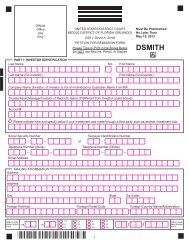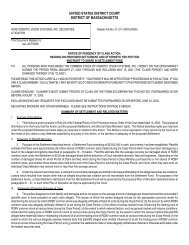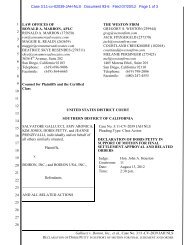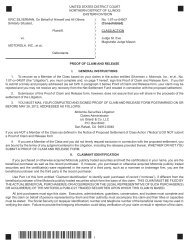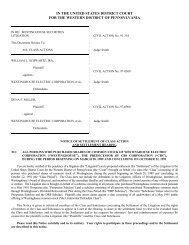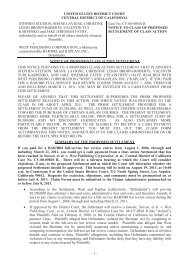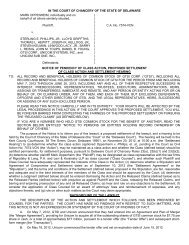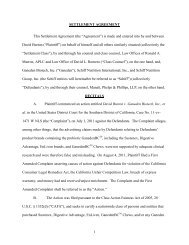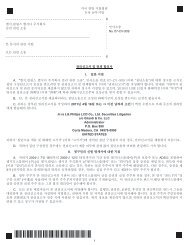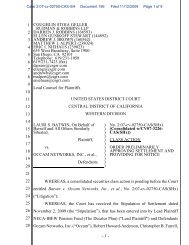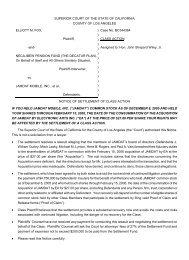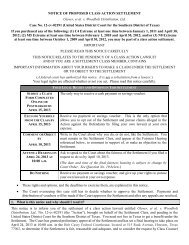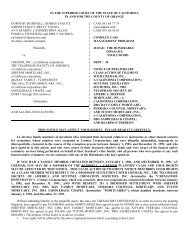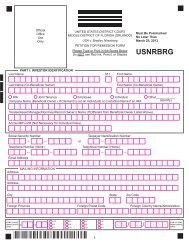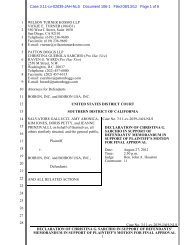Declaration of Brian C. Kerr ISO Plaintiffs - Gilardi & Co, LLC
Declaration of Brian C. Kerr ISO Plaintiffs - Gilardi & Co, LLC
Declaration of Brian C. Kerr ISO Plaintiffs - Gilardi & Co, LLC
You also want an ePaper? Increase the reach of your titles
YUMPU automatically turns print PDFs into web optimized ePapers that Google loves.
PRECEDENT-SETTING DECISIONS<br />
Milberg has consistently been a leader in<br />
developing the federal securities, antitrust, and<br />
consumer protection laws for the benefit <strong>of</strong> investors<br />
and consumers. The Firm has represented individual<br />
and institutional plaintiffs in hundreds <strong>of</strong> class action<br />
litigations in federal and state courts throughout the<br />
country. In most <strong>of</strong> those cases, Milberg has served<br />
as lead or co-lead counsel. The Firm has also been<br />
responsible for establishing many important<br />
precedents, including the following:<br />
• In Merck & <strong>Co</strong>., Inc. v. Reynolds 130 S. Ct.<br />
1784 (2010), Milberg, along with other co-lead<br />
counsel, won a significant victory before the<br />
U.S. Supreme <strong>Co</strong>urt, which issued a decision<br />
addressing when an investor is placed on<br />
“inquiry notice” <strong>of</strong> a securities fraud violation<br />
sufficient to trigger the statute <strong>of</strong> limitations<br />
under 28 U.S.C. § 1658(b). The <strong>Co</strong>urt<br />
unanimously ruled that the two-year statute <strong>of</strong><br />
limitations was not triggered because plaintiffs<br />
did not have actual or constructive knowledge<br />
<strong>of</strong> “the facts constituting the violation,” and as<br />
such, the case was not time-barred.<br />
Importantly, the <strong>Co</strong>urt held that the plaintiff<br />
must be on actual or constructive notice <strong>of</strong> facts<br />
concerning the defendants’ scienter in order to<br />
trigger the statute <strong>of</strong> limitations. This decision<br />
is significant in that it potentially enables<br />
plaintiffs to bring claims based on<br />
misstatements that are more than two years old.<br />
• In re Lord Abbett Mutual Funds Fee<br />
Litigation, 553 F.3d 248 (3d Cir. 2009). This<br />
important decision set significant precedent<br />
regarding the scope <strong>of</strong> preemption under the<br />
Securities Litigation Uniform Standards Act <strong>of</strong><br />
1998 (“SLUSA”). In reversing the District<br />
<strong>Co</strong>urt’s dismissal <strong>of</strong> the plaintiffs’ claims, the<br />
Third Circuit held that “SLUSA does not<br />
mandate dismissal <strong>of</strong> an action in its entirety<br />
where the action includes only some pre-empted<br />
claims.” In so holding, the court explained that<br />
“nothing in the language, legislative history, or<br />
relevant case law mandates the dismissal <strong>of</strong> an<br />
entire action that includes both claims that do<br />
not <strong>of</strong>fend SLUSA’s prohibition on state law<br />
securities class actions and claims that do . . . .”<br />
• Abdullahi v. Pfizer, Inc., 562 F.3d 163, 170 (2d<br />
Cir. 2009). In this matter, the plaintiffs,<br />
Nigerian children and their families,<br />
asserted claims under the Alien Tort Statute<br />
(“ATS”) in connection with Pfizer’s clinical<br />
trial <strong>of</strong> the drug, Trovan, without their<br />
knowledge. In January 2009, the Second<br />
Circuit reversed the District <strong>Co</strong>urt’s dismissal<br />
for lack <strong>of</strong> jurisdiction. The court held that the<br />
plaintiffs pled facts sufficient to state a cause <strong>of</strong><br />
action under the ATS for a violation <strong>of</strong><br />
international law prohibiting medical<br />
experimentation on human subjects without<br />
their consent.<br />
• In re <strong>Co</strong>mverse Technology, Inc. Derivative<br />
Litigation, 866 N.Y.S.2d 10 (App. Div. 1st<br />
Dep’t 2008). In this derivative case in which<br />
Milberg serves as co-lead counsel, plaintiff<br />
shareholders sued certain <strong>of</strong> the company’s<br />
<strong>of</strong>ficers and directors based on allegations <strong>of</strong><br />
illegal options backdating. The lower court<br />
dismissed the plaintiffs’ claims, holding that the<br />
plaintiffs failed to make a pre-suit demand on<br />
the company’s board, and that in any event, the<br />
board had already formed a special committee<br />
to investigate the misconduct. In this significant<br />
opinion reversing the lower court’s dismissal,<br />
the Appellate Division clarified the standards <strong>of</strong><br />
demand futility and held that a board <strong>of</strong><br />
directors loses the protection <strong>of</strong> the business<br />
judgment rule where there is evidence <strong>of</strong> the<br />
directors’ self-dealing and poor judgment. The<br />
court noted that the mere creation <strong>of</strong> a special<br />
committee did not justify a stay <strong>of</strong> the action<br />
and did not demonstrate that the board took<br />
appropriate steps. Rather, “the picture<br />
presented in the complaint is that <strong>of</strong> a special<br />
committee taking a tepid rather than a vigorous<br />
approach to the misconduct and the resultant<br />
harm. Under such circumstances, the board<br />
should not be provided with any special<br />
protection.”<br />
• South Ferry LP #2 v. Killinger, 542 F.3d 776<br />
(9th Cir. 2008). The important opinion issued<br />
by the Ninth Circuit in this securities fraud class<br />
action clarified, in the post-Tellabs<br />
environment, whether a theory <strong>of</strong> scienter based<br />
on the “core operations” inference satisfies the<br />
One Pennsylvania Plaza · New York, New York 10119 · T 212.594.5300 · F 212.868.1229 · milberg.com 9



